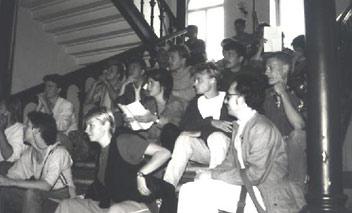If a factoid seems too good to be true, chances are it’s a false-oid. That turned out to be the case for a tweet that has circulated from various accounts over the last year, which claims: “Homosexuality was still classified as an illness in Sweden in 1979. Swedes protested by calling in sick to work, claiming they felt gay.”
Like the best shaggy-dog stories, it has the aura of credibility. After all, in the popular imagination, Swedes have both a generous welfare safety net and a healthy openness about human sexuality. Who in the world would be more likely than a Gothenborgian or a Malmovian to employ a cunning scheme that would allow them to both point out an injustice and enjoy a few days off on the government’s krona?
An English-language Google search proved unsatisfactory: The skimpy results all seemed to be variations on the sentences in the tweet. So Outward consulted its favorite Swede, Kristine Bergström (sorry, Anni-Frid Lyngstad!), to conduct more in-depth research, which is to say a Swedish-language Google search.
RFSL—the Swedish Federation for Lesbian, Gay, Bisexual and Transgender Rights—provided the definitive answer. According to the RFSL website, although homosexuality was legalized in Sweden in 1944, in 1979 it was still classified as a mental illness. The RFSL organized an occupation of the National Board of Health and Welfare, the Swedish agency in charge of classifying diseases, in order to push for the change.
Since the RFSL members intended to spend as long as a week at the National Board of Health and Welfare, they needed to protect their jobs by calling Social Security. Most didn’t want it to be known that they were gay, but a few did indeed call in sick, claiming that they were unable to work because they were homosexual. Indeed, one woman from Smaland even managed to get sick benefits from Social Security on this basis.
On Aug. 29, 1979, when between 30 and 40 people showed up at the National Board of Health and Welfare, the new director-general of Social Security, Barbro Westerholm, greeted them and agreed that the classification needed to be removed. The change took effect on Oct. 19, 1979.
Like the Stonewall rebellion and the Woodstock festival, many more people claimed to have been present at the board of health protest than were actually involved. RFSL says that only a few people called in sick, of whom just one managed to qualify for paid leave on the basis of her homosexuality. The biggest misconception, though, is the claim that the phone calls were the protest; in fact, they were simply a way of enabling the occupation of the National Board of Health and Welfare.
